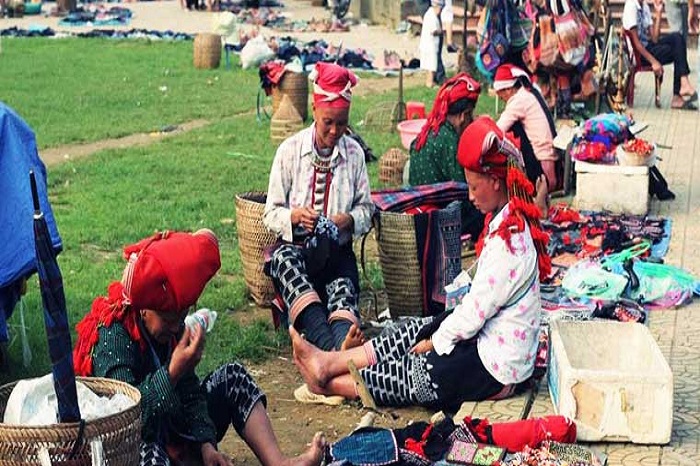
Top 7 ethnic markets in North Vietnam
- on Mar 18, 2020 By: Ngoc Nguyen
Unlike other mountainous neighbours, the mountain markets never sleep in Lao Cai province where every day, there is a reason to go to the market. Once visited, many people confide that beyond a market, each corner is a place of life that demonstrates all activity of this community of great diversity. Just know where and when each of these high places takes place to enjoy them during your trip.
If the Ban Phiet market welcomes you on Monday, the Coc Ly market on Tuesday, Lung Khau Nhin on Thursday... the rest of the week, every day has its character, also something to slow you down. Do not hesitate to fall in love with its sumptuous and warm alleys that look like flower gardens inspired by the bright fabrics of Hmong, Tung, and Day women.
Ban Phiet market on Monday
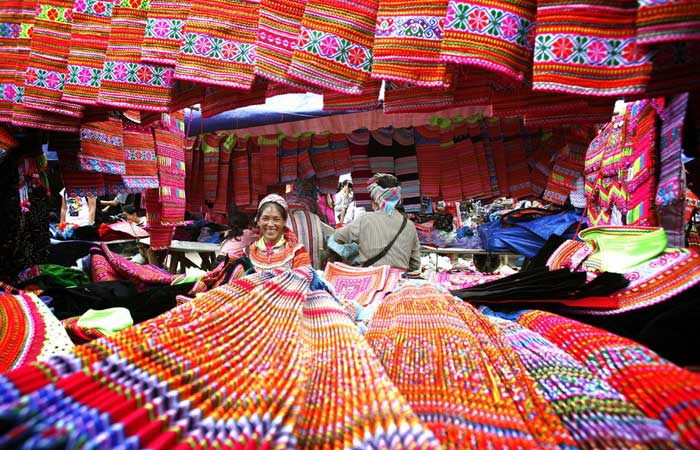
The Ban Phiet market takes place on the first day of the week on Monday, just off the 4D national road. Quite small and less numerous compared to the others in Lao Cai, it stands out as the centre of any local exchange of white Hmong. Sellers and buyers alike flock there very early when the misty sail is accompanied by the cold in the high mountains. With traditional festivals, the weekly market is a pretext for its inhabitants to be there with their most beautiful highly coloured clothes.
* Access: Ban Phiet commune, Bao Thang border district.
Coc Ly market on Tuesday
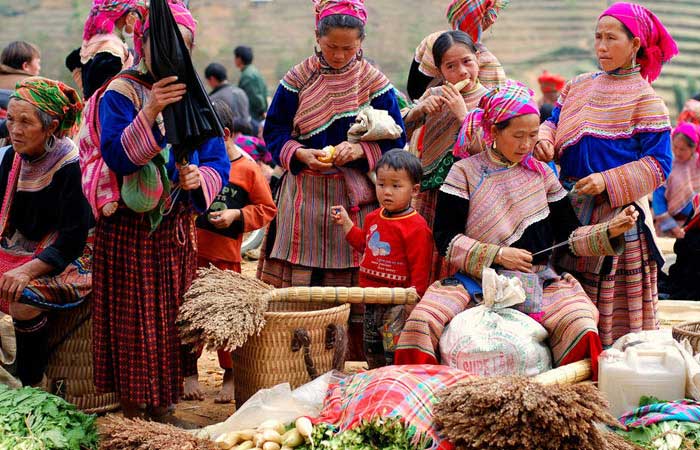
Animated every Tuesday, the Coc Ly market has demarcated sections for brocades, mountain goods, animals, and gastronomy. A high place of exchange of colourful Hmong, Black Dao and Nung, this market is renowned for its particular character, the custom of exchange "commodity for commodity". You take the boat while admiring a wild and peaceful surrounding to access the market upstream of the Chay river.
* Access: Bac Ha district.
>> Read more: Coc Ly market to visit in Bac Ha
Cao Son and Sin Cheng markets on Wednesday
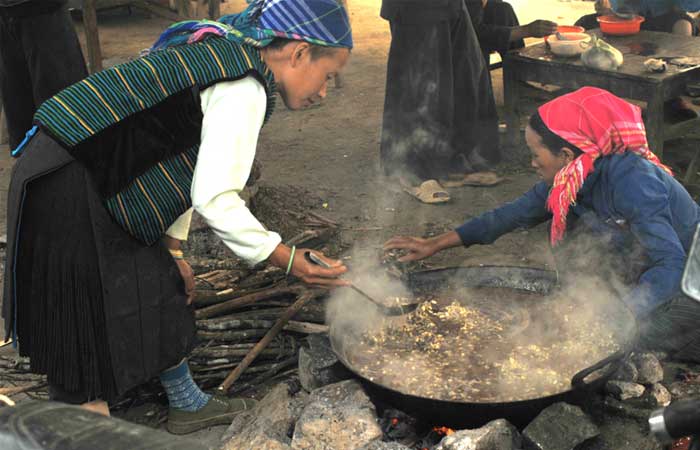
Visitors have the opportunity to meet merchants from the Hmong, Phu La, Dao and Black Han who populate the four largest villages in Muong Khuong district. After a stop around the stands full of vegetables, local fruits and animals, try to taste one of the culinary specialities, the "Thang co" or the Coc Dam corn wine with a specific taste, etc. Grab your camera because from all corners you can see the colourful men and women busy making up a painting in the middle of the mountains.
* Access: Cao Son commune, Muong Khuong district.
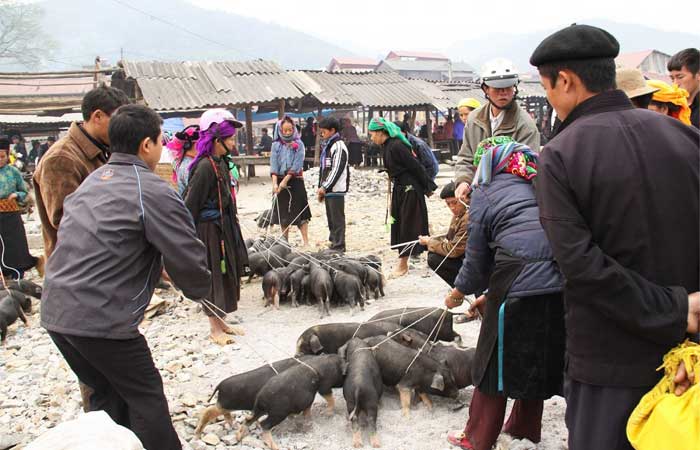
Every Wednesday, the Sin Cheng market is in full swing from early morning until noon when the Hmong, Nung, and Thu Lao. bring their best products with them. Men do not forget to bask with the first bites of fermented alcohol by themselves while women work on the presentation of craft stalls. Note that in the Si Ma Cai district and also other districts of Lao Cai, the horse is no longer the only means of transport but it remains very present in the Sin Cheng market, as a good companion of goods. Its most popular products are rice, black chicken and dwarf pig and in particular, its local duck of exceptional quality which is not found elsewhere.
Given its location far from the rest of Lao Cai, the Sin Cheng market remains little frequented by tourists. Put yourself in its authentic atmosphere where you are comfortable with the exchanges that are done in a simple way, without insistence or haggling. Salivate in front of the steaming bowls of ethnic "Pho" or simply get a little closer to a pan of "Thang co" to enjoy Lao Cai's most popular dish. Do not forget to stroll through the very lively part of the market reserved for oxen and buffaloes which are sold in large numbers.
* Access: more than 10 km from Si Ma Cai border district.
Lung Khau Nhin market on Thursday
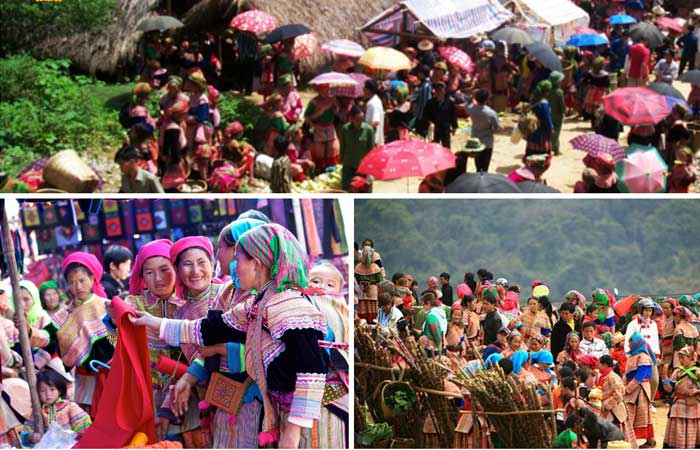
One of the best known markets of Lao Cai and the awe-inspiring mountainous areas of the North West, Lung Khau Nhin is ideal for witnessing most of the activities of the Hmong, Nung, Man and Kinh. whose costumes will blow your eyes away once you arrive. In the multitude of stalls of cabbage, clementines, clothes, mattresses... no matter what your purchases, meeting and talking with the locals are in the spotlight to experience new things.
* Access: Muong Khuong district.
Chau market on Friday
One of the oldest in Muong Khuong, the 19th century Chau market was a major trading centre in the region. Soak up the local flavours of the merchants of rice, corn, potatoes, young bamboo, honey and medicinal products. The decor of the brightly coloured costumes and the umbrellas typical of the women and girls of the Hmong, Lo Lo, Tay, Nung and Giay will invade you throughout your walk. Strolling through its corners, visitors will enjoy so many activities reflecting the old traditions preserved over the centuries.
* Access: Lung Vai commune, Muong Khuong district.
Can Cau and Pha Long markets on Saturday
Can Cau market - It is on road 153, the only access in red soil connecting the Bac Ha and Si Ma Cai districts that you go to the most important buffalo market in the Northern regions. Grouping the Hmong, Hoa, and Giay but this market takes place according to the usual customs of the Dao.
* Access: Si Ma Cai border district.
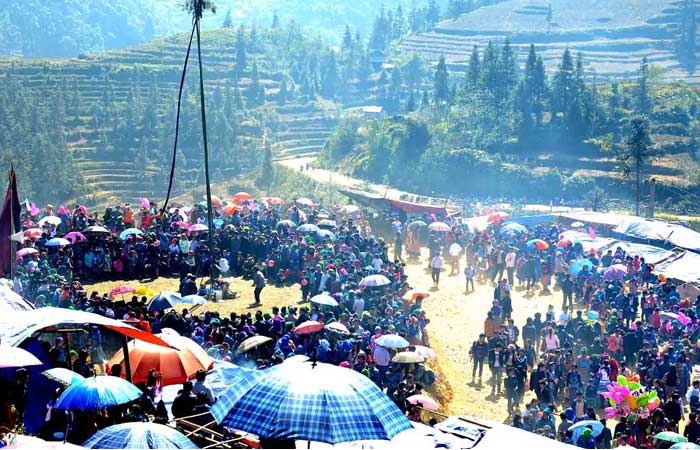
Classified in the list of national intangible cultural heritage, the Gau Tao festival is the traditional festival of the Hmong ethnic group in Lao Cai, linked to the belief in prosperity and happiness.
The name "Pha Long" means "a giant dragon" or a large market. In full excitement, there are a lot of local products and specialities, the most famous of which are Seng Cu rice, chilli and sugar cane. The most frequented and tumultuous corner is always that of the brocades. Colourful, let yourself be tempted by all kinds of handicrafts. This weekly gathering of the Hmong, Lo Lo, Tay, Nung, Giay in Pha Long market is particularly exciting during the Gau Tao spring festival held during the traditional Tet. Another point of interest for your Saturday at the Vietnamese-Chinese border district, the Y Ty market is also worth a visit.
* Access: Pha Long commune, Muong Khuong district.
Bac Ha and Sapa markets on Sunday
Elected 1st among the top 10 most original mountain markets in Southeast Asia by Serendib magazine, the Bac Ha ethnic market is the most lively and important of the mountainous regions, attracting a dozen different ethnic groups from the region and its surroundings.
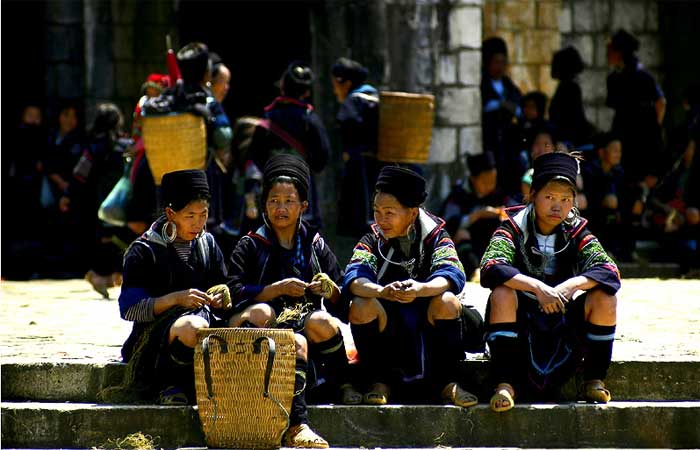
Long awaited every Sunday, the Bac Ha market is a place of exchange and meeting of the Hmong, Dao, Tay and Nung. In an explosion of colours and scents, the brocade stands offer you the best choices of souvenirs bearing the soul of the country's ethnic mosaic. This market is unique in the country where sellers and buyers of horses share an exclusive place with hundreds of animals sold each session.
* Access: Bac Ha village, Bac Ha district.
>> Read more: Bac Ha ethnic market, under the sign of authenticity
The Sapa market is held every Sunday to the delight of tourists and locals. There is everything, from household products to rare medicinal products through crafts, not to mention the dishes typical of ethnic populations. As of the previous day, another atypical market was already held, more often in the flute singing and folk songs. It’s the famous Sapa love market where men and women meet around the fire, taking advantage of the music to find their lover.
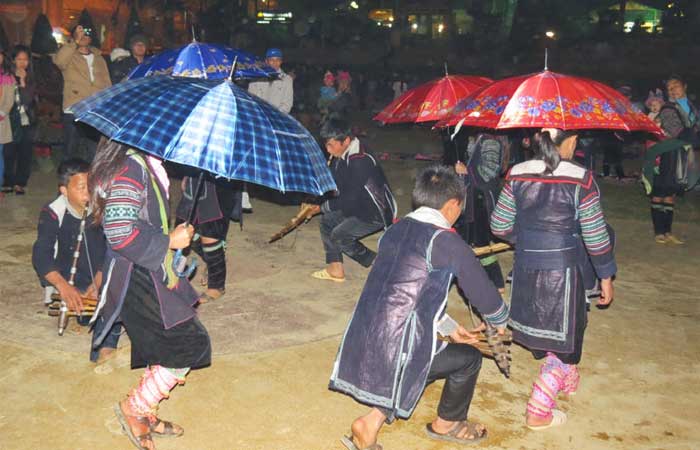
Despite its large concrete space, ethnic merchants do not leave their privileged place of outdoor sales. Located in the heart of the district, the market remains as it has for years, preserving traditional customs that visitors never tire of appreciating.
* Access: The centre of the Sapa district.
During your stay in Lao Cai, you can take advantage of other Sunday markets such as Lung Phinh (Bac Ha district), and Muong Hum (Bat Xat district) which are full of surprises for your immersion in local life.
>> Does these mountain markets full of character make you want to visit? Go with a Vietnamese travel agency to discover the splendour and the richness of ethnic groups in North Vietnam.
Related articles:
>> Vietnam tour 2023-2024: Where to go? Which itinerary? What to do? How many days?
>> An unusual stay in Sapa in the Ta Van and Ta Phin villages
 Español
Español Français
Français






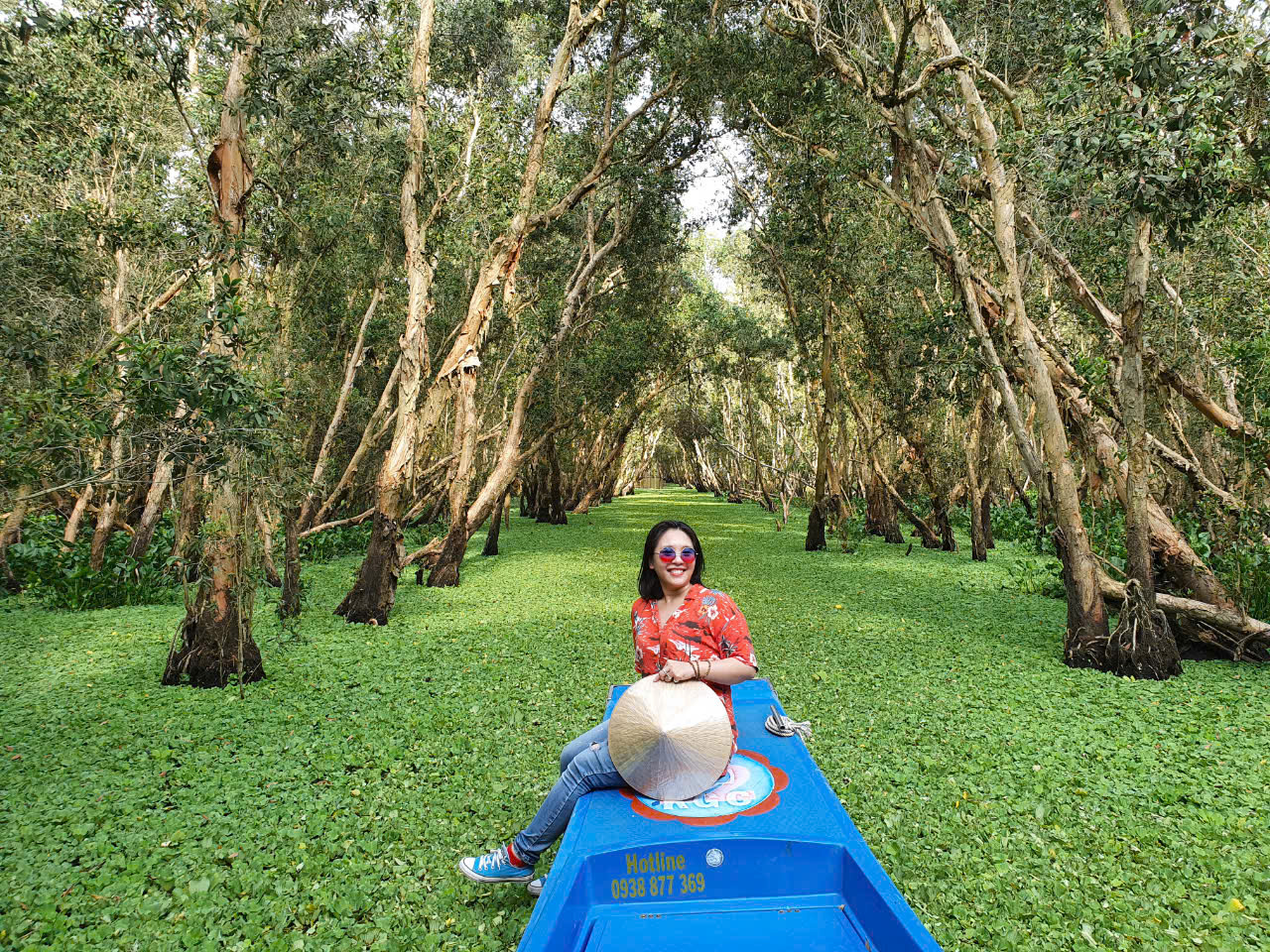
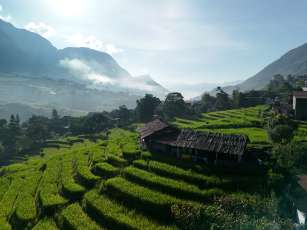
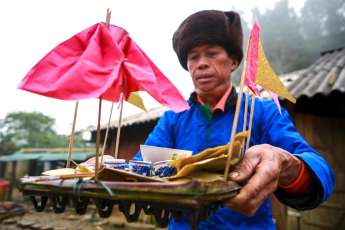
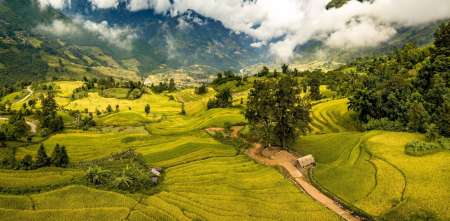
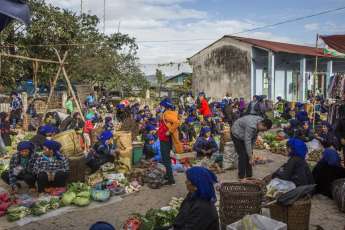
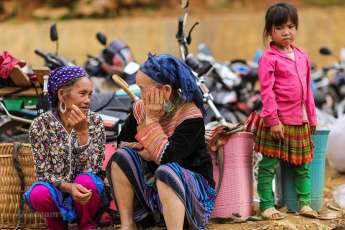
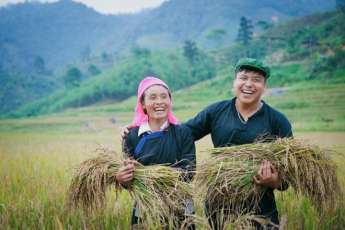







Morgane Ter Cock
on Dec 18, 2025HerbertPhomaMS
on Oct 19, 2025Lilyan Cuttler
on Oct 15, 2025Avenue17XC
on Sep 14, 2025Avenue18JL
on Jul 21, 2025